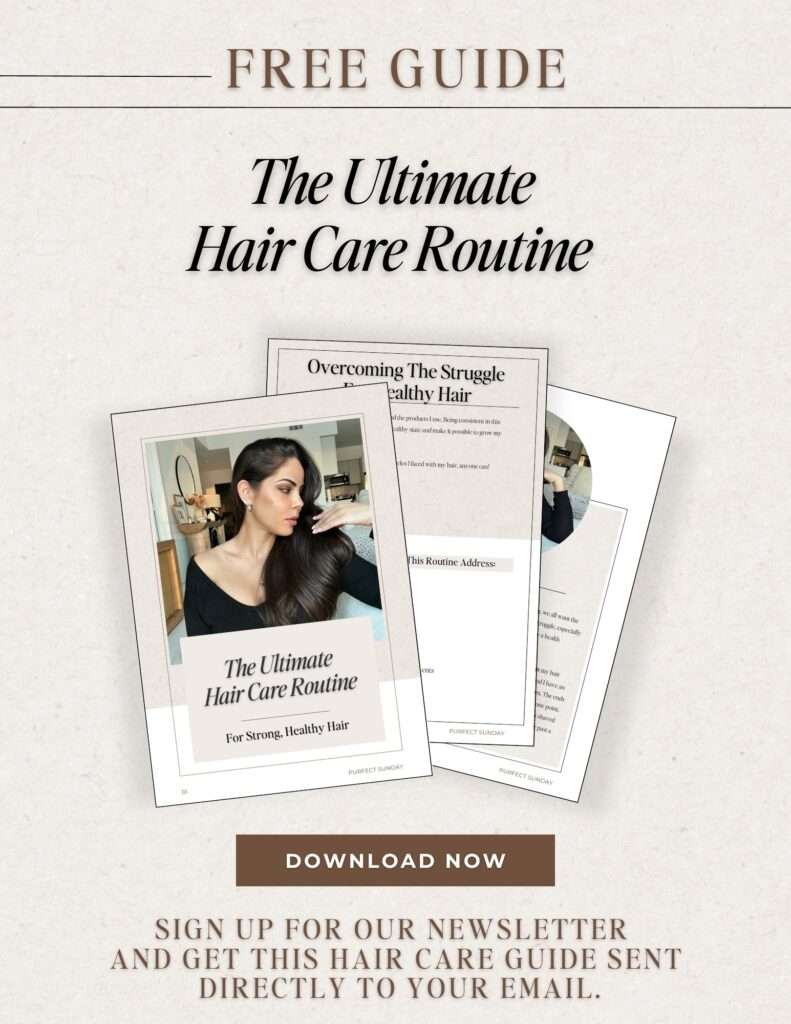
The 19 Ultimate Winter Hair Care Tips You Need To Know
If you live in an area with harsh winter weather, you will probably notice that the cold winter months can zap your hair of all moisture and leave it feeling dry and parched. In the same way that your skincare routine needs to change for the cold season, so does your hair care routine. With the right winter hair care routine and hair products, you can avoid most of the damage that commonly occurs during the winter or bring dry hair back to health.
So, if you are ready to say goodbye to your winter hair woes, read on for the ultimate winter hair care tips you need to know. I promise your hair will thank you this winter season!
Winter Hair Care Tips You Should Know
1. Avoid Frequent Washing
If you like washing your hair every day, winter is a good time of year to change this habit. Especially if you have a dry, flaky scalp. Overwashing your hair strips your scalp and hair of the natural oils that keep hair moisturized, healthy, and protected. This lack of moisture leads to a dry scalp and brittle hair.
Instead, try extending the time between washes so that you only wash your hair once or twice a week. Using dry shampoo between washes can help keep your hair looking and smelling fresh.
2. Choose Hair Care Products Carefully
When it comes to preserving the health of your hair, you should know that the hair care products you use will make a huge difference. There are two things to keep in mind when shopping for shampoo and conditioner.
The first thing is to find a sulfate-free shampoo. Sulfates are found in many skin and hair products. They are the agents that are responsible for creating that satisfying later we love when massaging in our shampoo. The problem is that sulfates strip the natural oils from your strands, which can potentially weaken your hair and cause damage.
The second thing is to find a product that is formulated for your specific hair type.
- Clarifying Shampoo for oily hair or normal hair with lots of product buildup.
- Volumizing Shampoo contains volumizing ingredients for fine hair.
- Normal Hair Shampoo for normal hair types.
- Color Treated Shampoo won’t strip the color from color-treated hair.
- Hydrating Shampoo for dry, frizzy hair.
- Strengthening Shampoo contains ingredients that add elasticity and structure to the hair follicles to strengthen and protect hair.
Pureology is my favorite shampoo brand, and I’ve been using their Hydrate Shampoo & Conditioner for years. Every few months, I use Ouai Detox Shampoo to remove any product buildup. I do find it to be drying, though, so I always follow with a hair mask. The Soulfood Nourishing Hair Mask from Amika is amazing!
3. Never Skip Conditioner
The key to keeping hair healthy during the winter is to keep it from drying out. After washing your hair, always follow with conditioner. A deep conditioner adds some much-needed hydration back into your hair after striping it of oils with the shampoo. If you live in a particularly cold climate or are exposed to a lot of dry indoor heat, using a leave-in conditioner for extra protection is a good idea.

4. Use Microfiber Towels
Microfiber towels are extremely absorbent. When used in place of a regular towel, will greatly cut down on air drying and blow drying time. And because they are also much more gentle on your hair than standard cotton bath towels, your hair will be less frizzy after using one.
5. Lower The Water Temperature
I know that a long, hot, steamy shower on a cold winter day sounds like heaven. And it’s probably one of the winter hair care tips that I struggle with the most. (I’ll thank my Hashimotos Disease for making me almost permanently cold) but isn’t so great for your hair’s health. Hot water strips your hair (and skin) of its natural oils, drying it out and making it more prone to breakage. Skip the hot showers and instead use lukewarm water (not cold water, there’s no need to torture yourself) to wash and rinse your hair.
6. Limit Heat Styling
Limit how often you use high heat to style your hair, if possible. Heat styling tools cause hair damage by drying out hair strands. This again leads to hair breakage, split ends, and dry, dull hair. Try exploring new heatless ways to style your hair, like braids and buns or the viral satin heatless curling set. If you must use hot tools, heat protectants are a must to guard against winter dryness and limit damage.

7. Regular Oil Treatments For Your Hair and Scalp
Weekly oil treatments are a great way to add moisture to your hair and help you avoid a dry, itchy scalp. The scalp can also become dry during the colder months of winter, especially if it’s constantly exposed to dry air.
Some hair textures respond to various oils differently. I would experiment with oils until you find a hair oil you like for your hair. Some of the best oils for your hair are:
- Coconut Oil
- Jojoba Oil
- Olive Oil
- Almond Oil
- Argan Oil
- Castor Oil
Try massaging oil into your scalp and coating hair all the way to the ends. Let it soak in for at least 20 minutes before you shampoo it out. Even better is to leave the oil in overnight and then wash your hair in the morning. Because the oil can be messy, it’s a good idea to have a pillowcase dedicated to oil treatment nights.
8. Buy A Humidifier
Cold winter weather and warm indoor heating dry out the air and evaporate the moisture right out of your hair, making it vulnerable to breaking. You can avoid this by placing humidifiers inside your home to add moisture back into the air.
9. Wear A Hat
Exposure to rain, snow, and cold air is a real stress factor for hair. Wearing a cozy winter hat will minimize exposure to harsh weather and keep it protected. Although you want to keep your hair covered, wool, cotton, and other coarse fabrics can damage your hair. The best option is to find a hat with a silk lining or first cover your hair with a silk scarf before putting on your hat.

10. Reduce Static
Fighting hair static is a typical winter weather challenge. Keeping your hair hydrated is the best way to help prevent this from happening. A lightweight leave-in conditioning product will help hydrate parched strands, reduce frizz, and annoying static electricity.
11. Don’t Go Outside With Wet Hair
If you go outside with wet hair in icy climate areas, hair can freeze and break off. If you don’t have the time to let your hair air dry indoors, it’s better to use a blow dryer to dry it before heading outside.
12. Stay Hydrated
I always found it hard to drink plenty of water when I’m in cold weather. Just like the rest of the body, hair needs water to stay healthy. If you’re consistently dehydrated, your hair will be affected. Healthy hair growth can slow down or even stop altogether, and the hair shaft can become brittle and develop split ends. The good news is that by drinking more water and staying hydrated while also taking care of your scalp with oil treatments to treat dry skin, new hair growth can start to grow, and hair health can be improved.
13. Commit To Weekly Hair Masks
Committing to a weekly hair mask can significantly affect your hair’s health in a positive way. They can reverse dryness, and regular treatments will help prevent future damage while keeping hair in optimal health throughout the year. Find a hair mask suited to your specific hair needs. Apply the mask to damp hair at least once a week. Leave the product in your hair for a minimum of 20 minutes. If you have the extra time, keep it in for even longer!

14. Add Healthy Fats To Your Diet
Your diet is just as important to hair health as staying properly hydrated. A balanced diet of fresh whole foods that include clean proteins, healthy fats, fresh fruits, and vegetables will provide the nutrients needed to grow strong, healthy hair.
15. Get Regular Trims
Getting regular trims will reduce the risk of developing dry ends that will lead to breakage. Taking off the bottom 1/2 inch every 8-12 weeks is usually a good place to start. If split ends are left unmanaged, the hair will continue to split up the hair shaft, causing further damage.
16. Nightly Scalp Massage
Doing a scalp massage every night before bed only takes a few minutes. Massaging your scalp with either your fingers or a small tool enhances blood circulation in the head and neck area, which brings oxygen and hair-healthy nutrients to the hair follicles. This can help stimulate increased hair growth and hair thickness.
17. Brush And Comb Hair Gently
Brittle, dry hair tangles more easily. It’s important to untangle and comb your hair slowly and carefully to avoid damaging it. To reduce strain and possible breaking of the hair, start from the middle of your hair length and work downwards using a wide-tooth comb. Once all the tangles are removed, you can use a hair brush to finish brushing your hair.
18. Sleep With A Silk Bonnet
I haven’t ever slept with a hair bonnet, but I know people who love them. Sleeping with a silk bonnet reduces friction between your hair and the pillowcase while you sleep. It also keeps hair hydrated, prevents tangles, and reduces the amount of frizz you’ll wake up to. After writing this, I think I’ll buy myself a silk bonnet very soon.
19. Use a Silk Pillowcase
Sleeping on a silk pillowcase is something that I can recommend and personally swear by. Not only are they better for your hair, but they are also more gentle on your face while you sleep. That’s a double win! This is because sleeping on cotton is known to cause friction every time you toss and turn. This, in turn, leads to tangles and hair breakage, while the smooth texture of silk helps prevent that from happening.
I Hope You Try These Winter Hair Care Tips
Taking proper care of your hair definitely requires extra time and effort, but if you want healthy hair, it’s necessary. I have no doubt that if you are able to follow even just a few of these winter hair care tips it’ll go a long way to bringing dry hair back to a healthy state, and keep it there!
Xx Monti



Sandy
These tips work!,
purfectsunday
SandyI’m happy to hear it!